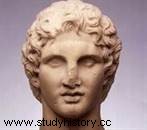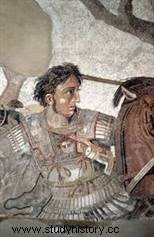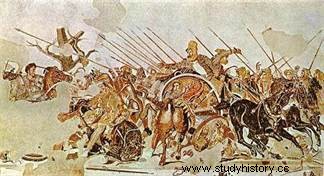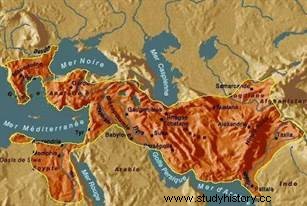 Alexander the Great (356-323 BC) was an ancient Macedonian king and was one of the greatest conquerors in history. Educated by the philosopher Aristotle, he became king in 336 BC after the assassination of his father Philip II. After suppressing several revolts, in 336 BC. AD, Alexander leads a vast expedition against the Persians. His successive victories opened almost the entire Persian Empire to the Macedonians. After taking Babylon, Suze and Persepolis, Alexander continued his conquest towards India. He crosses the Indus then reaches the foothills of the Himalayas, before returning to Babylon to administer his conquests. His empire did not survive him, unlike the cultural heritage he had spread to the East.
Alexander the Great (356-323 BC) was an ancient Macedonian king and was one of the greatest conquerors in history. Educated by the philosopher Aristotle, he became king in 336 BC after the assassination of his father Philip II. After suppressing several revolts, in 336 BC. AD, Alexander leads a vast expedition against the Persians. His successive victories opened almost the entire Persian Empire to the Macedonians. After taking Babylon, Suze and Persepolis, Alexander continued his conquest towards India. He crosses the Indus then reaches the foothills of the Himalayas, before returning to Babylon to administer his conquests. His empire did not survive him, unlike the cultural heritage he had spread to the East.
Alexander King of Macedon
The history of ancient Macedonia is not well known. Many migrant populations settled there during the Neolithic period (c. 6,200 BC). After 3000 BC. J. - C., a people of Greek language begins to occupy the mountainous areas located between the mounts Olympe and Pinde. In the 7th century BC. BC, Perdiccas I establishes his kingdom in the rich alluvial plains of Aliákmon and Axios. In the 4th century BC. J.-C., Philippe II led the kingdom on the path of prosperity and expansion. He defeats the Greeks in 338 BC. AD and unites Greece and Macedonia into a single kingdom.
In 336 BC, Alexander, son of Philip II and Princess Olympias of Epirus, succeeded his murdered father and became King of Macedonia at the age of eighteen. Bold, courageous and of a bellicose nature, he benefited from an excellent education thanks to his tutor Aristotle. His whole childhood had been rocked by the exploits of Hercules and Achilles, legendary ancestors of Macedonian royalty. As a teenager, he distinguished himself in combat in the paternal army. Gifted with a strong personality, Alexandre had no equal in leading his men through adversity and danger. An excellent rider (his horse was named Bucephalus), the young prince also learned the art of war, notably by assisting his father at the battle of Chaeronea in 338 BC. AD
 At his death, Philip II of Macedon, who had just subjugated the Greek cities, was preparing to invade the 'Persian Empire. Determined to carry out his father's project, Alexander had to delay this project to quell a revolt in his own country. The last attempt to conquer Greek territory by the Persians dated back 150 years. Since then, the Persian Empire had continued to decline. However King Darius III, whose wealth far exceeded that of Alexander, was able to raise large armies from all corners of his vast empire, from the Mediterranean to the Indus.
At his death, Philip II of Macedon, who had just subjugated the Greek cities, was preparing to invade the 'Persian Empire. Determined to carry out his father's project, Alexander had to delay this project to quell a revolt in his own country. The last attempt to conquer Greek territory by the Persians dated back 150 years. Since then, the Persian Empire had continued to decline. However King Darius III, whose wealth far exceeded that of Alexander, was able to raise large armies from all corners of his vast empire, from the Mediterranean to the Indus.
This vastness could also prove to be a handicap. Messengers took weeks to cross the Persian Empire, and soldiers months to join their regiment. Certainly very superior in number, the Persian army, motley and colorful, was difficult to control on the battlefield. The famous Macedonian phalanx , on the other hand, well equipped and over-trained, showed itself to be mobile and experienced in military tactics. At their head, Alexander was a charismatic and inspired leader, while Darius remained unobtrusive and unimaginative.
At the end of summer 336 BC. J.-C., Alexandre established his position in Greece and received the command of the Greek forces, at the time of the assembly of the States joined together in Corinth (see league of Corinth). From then on, the new sovereign of Macedonia entrusted the regency to his mother Olympias and embarked on his first campaigns. In 335 BC. AD, he led a brilliant military operation against the Thracian rebels on the banks of the Danube. On his return to Macedonia, he crushed the same week, near Lake Prespa, the Illyrians and Dardanians who had seceded, and headed in haste towards the revolted city of Thebes. He destroyed it "to the sound of flutes", sparing only the temples of the gods and the house of the poet Pindar, and enslaved some 30,000 prisoners. Alexandre now has his hands free to turn to the east.
The conquest of Persia
In the spring of 334 BC. J.-C., Alexander leaves the government of Macedonia to one of his generals, Antipatros, and goes to war against the Persian Empire:then begins a new “Iliad”, that of the admirer of Homer. Surrounded by his best generals, Antigonos, Ptolemy and Seleucus, he crosses the Hellespont (the modern Dardanelles) with an army of 35,000 men. On the banks of the Granicus, near the ancient city of Troy, he defeated an army of 40,000 Persians and, according to tradition, lost only 110 men. Legend has it that Alexander, having failed to untie the mythical Gordian knot during his march in Phrygia, would have cut it with a sword blow - an omen of his Asian destiny.
 In 334 BC. j-c, after his victory at Granique , Alexander seizes Asia Minor, freeing the Greek coastal cities from the Persian yoke. Nevertheless, his fleet does not allow him to risk himself in a maritime confrontation, and the Persians risk at any time taking him from behind at sea. Renouncing to sink further inland, the Macedonian chooses to cross the Syria and to follow the Mediterranean to Phoenicia, in order to reach the bases of the Persian fleet. Along the way, he crushes the Persian army commanded by Darius in person at Issos (333 BC).
In 334 BC. j-c, after his victory at Granique , Alexander seizes Asia Minor, freeing the Greek coastal cities from the Persian yoke. Nevertheless, his fleet does not allow him to risk himself in a maritime confrontation, and the Persians risk at any time taking him from behind at sea. Renouncing to sink further inland, the Macedonian chooses to cross the Syria and to follow the Mediterranean to Phoenicia, in order to reach the bases of the Persian fleet. Along the way, he crushes the Persian army commanded by Darius in person at Issos (333 BC).
 From now on the Persians offered only weak resistance to Alexander. Skilful, he is generous with the cities and provinces that gave themselves up, promising not to raise taxes and to prevent his men from looting them. This policy bore fruit:many cities agreed to surrender to escape destruction and looting. Others, however, like Tyr , the main Phoenician port, refused surrender. After eight months of siege, the Greco-Macedonian troops took the city whose survivors were sent into slavery.
From now on the Persians offered only weak resistance to Alexander. Skilful, he is generous with the cities and provinces that gave themselves up, promising not to raise taxes and to prevent his men from looting them. This policy bore fruit:many cities agreed to surrender to escape destruction and looting. Others, however, like Tyr , the main Phoenician port, refused surrender. After eight months of siege, the Greco-Macedonian troops took the city whose survivors were sent into slavery.
The capture of this strategic port ensuring his rear, Alexander can set his sights on Egypt , fallen under Persian domination for two centuries. He is welcomed there as a liberator and is proclaimed pharaoh in the ancient capital of Memphis. In the Nile delta, he founded Alexandria then went to the desert to the sacred site of the oasis of Siwa, where the oracle of Amon would have revealed to him that he was not the son of Philip, but the one of Zeus, the patron of the Greek gods. The prestige of Alexander was such that many began to consider him a living god, starting with Alexander himself.
Alexander the Great in the East
In October 331 BC, Alexander decided to leave Egypt to attack the heart of the Persian Empire. To Gaugameles in Assyria, he imposed a second defeat on Darius , whose army was six times greater in number than that of the Macedonian, whose army rarely exceeded 50,000 men. Alexander seizes the Persian capitals, Babylon, Susa and finally Persepolis, which will be symbolically set on fire. It was the coup de grace:losing all hope Darius fled. He died shortly after murdered by relatives.
 Over the next three years, the Greco-Macedonian army continued its journey through Central Asia, completing conquer the Persian Empire, which finally disappeared in 327 BC. J-C. Alexander then turned to Northern India . Arriving at the foot of the Himalayas, he won a final battle on the Hydaspes River (now northern Pakistan).
Over the next three years, the Greco-Macedonian army continued its journey through Central Asia, completing conquer the Persian Empire, which finally disappeared in 327 BC. J-C. Alexander then turned to Northern India . Arriving at the foot of the Himalayas, he won a final battle on the Hydaspes River (now northern Pakistan).
Exhausted, his army on the verge of sedition urges him to turn back. Alexander, who would gladly have continued further east, agreed to turn back. At the head of his army, he followed the course of the Indus to the Sea of Oman, before beginning a painful crossing of the desert of Gedrosia (in Iran). In 324 BC. J-C he was back in Babylon, his new capital.
Alexander the Great was planning further conquests in the Persian Gulf and the East, when he died suddenly in Babylon in June 323 BC, only 32 years old, probably a victim of his alcoholism. Convinced of his divine nature, he began to reign as a tyrant. Having neglected to set up a central government to hold his empire together, it quickly descended into anarchy.
At a young age, Alexander's heirs were quickly eliminated. As for his generals, to whom Alexander had entrusted the government of the conquered provinces, they clashed in successive wars and each created their own independent kingdom. Only Ptolemy in Egypt and Seleucus in Persia founded lasting dynasties.
The legacy of Alexander the Great
During his conquests, Alexander had spread the culture of Greek civilizations across Asia to the Indus Valley. It was by the tens of thousands that the Greeks emigrated to the dozen new cities established in the conquered territories and often named in honor of Alexander. Greek culture and language spread widely among the peoples conquered by Alexander, whose conquests favored commercial exchanges as well as the circulation of men and ideas.
 The so-called h period ellenistic refers to this era of supremacy around the Mediterranean and the Near East. Splendid cities like Alexandria, Pergamon or Seleucia dethrone Athens as centers of Hellenic culture . The arts flourished, and scientists, mathematicians and astronomers like Archimedes, Euclid and Eratosthenes also marked this flourishing period. The dissemination of Greek culture is nevertheless limited to the elites, the populations essentially retaining their local customs.
The so-called h period ellenistic refers to this era of supremacy around the Mediterranean and the Near East. Splendid cities like Alexandria, Pergamon or Seleucia dethrone Athens as centers of Hellenic culture . The arts flourished, and scientists, mathematicians and astronomers like Archimedes, Euclid and Eratosthenes also marked this flourishing period. The dissemination of Greek culture is nevertheless limited to the elites, the populations essentially retaining their local customs.
The Hellenic World had to give way to the growing power of Rome. Greece and Macedonia bowed in the middle of the 2nd century BCE of the kingdom. The Seleucid and Ptolemaic kingdoms fell for their part in 64 and 30 BC. The Romans, however, showed great respect for Greek culture, to which they owed many borrowings, particularly in architecture, science, literature, and mythology, assimilating without complex the legacy of Alexander. His exploits are mentioned in the Bible and the Koran.
Over the centuries, Alexander inspired many other conquerors . Even today, budding military strategists study the famous battles of the Macedonian, who, at the head of a few thousand men, pushed back the limits of the known frontiers of the time, in an incredible epic.
Frequently asked questions about Alexander the Great
Which philosopher is reputed to have trained Alexander the Great?
This is the Greek philosopher Aristotle which provided the young Alexander with a solid education in rhetoric and literature and also stimulated his curiosity in science, medicine and philosophy.
Which empire did Alexander the Great conquer?
This is the Persian Empire , founded by Cyrus the Great in the 6th century BC and whose main capital is Persepolis. In 330 BC, after defeating the Persian Darios III at the Battle of Issus, the Macedonian annexed the Persian Empire to his own empire.
How did Alexander the Great die?
Returning from the campaign that took him to the borders of the Indus, Alexander returned to Babylon in the spring of 323 BC. In June, he contracts a fever and die. After his disappearance, his vast empire falls apart, divided between his main generals.
Bibliography
- - By Olivier Battistini, Alexander the Great:a philosopher in arms. Ellipses, 2018.
- - By Gérard Colin, Alexander the Great .Pygmalion, 2007.
- - From Quinte-Curce, History of Alexander. Folio, 2007.
